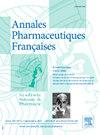Analyse des interventions pharmaceutiques relatives au traitement ambulatoire de l’insuffisance cardiaque chronique
IF 1.1
Q4 PHARMACOLOGY & PHARMACY
引用次数: 0
Abstract
Objectif
L’objectif de notre étude était d’analyser les interventions pharmaceutiques relatives au traitement ambulatoire des patients atteints d’insuffisance cardiaque (IC).
Matériel et méthodes
Une étude observationnelle a été réalisée pendant une période de 6 mois à l’Institut de cardiologie d’Abidjan (ICA). Les données ont été recueillies à l’aide d’une fiche d’enquête qui portait, entre autres, sur l’observance thérapeutique du patient, les problèmes liés à la thérapeutique (PLT) et les interventions pharmaceutiques (IP). L’outil de codification des PLT et IP de la Société française de pharmacie clinique a été utilisé. L’adhésion des patients a été évaluée à l’aide de l’outil GIRERD. L’ensemble des traitements a été analysé selon l’algorithme de Calop. Les impacts clinique, économique et organisationnel des IP acceptées par le médecin ont été cotés à l’aide de l’outil CLEO.
Résultats
La population d’étude avait un âge moyen de 51,4 ans. La prévalence des PLT était de 59 %. Ces PLT étaient essentiellement de type problème d’adhésion (43 %) et interactions médicamenteuses (39,7 %). Les IP ont été principalement de type « optimisation des modalités d’administration » (43,6 %) et « suivi thérapeutique » (38,1 %). Le taux d’acceptation des IP destinées aux prescripteurs était de 80,8 %. La majorité de ces IP a été cotée « IP à impact clinique mineur » (60,2 %), « IP sans impact économique » (83,8 %) et IP à « impact organisationnel positif » (63,2 %).
Conclusion
Les PLT et plus précisément les problèmes d’adhésion et interactions médicamenteuses sont fréquents dans la prise en charge ambulatoire de l’insuffisance cardiaque chronique. Le pharmacien peut contribuer à l’amélioration de cette prise en charge par l’évaluation régulière de l’observance thérapeutique et la gestion des PLT.
Objective
Our aim was to analyze pharmaceutical interventions related to heart failure (HF) outpatient treatment.
Methods
An observationnal study was carried out over 6 months at the Abidjan Institute of Cardiology (ICA). Data were collected using a survey form that focused on therapeutic adherence, drugs related-problems (DRP) and pharmaceutical interventions (PI). DRP and PI coding tool of French Society of Clinical Pharmacy was used. Therapeutic adherence was assessed using the GIRERD tool. Prescription review made by Algorithm of Calop. Clinical, economic and organizational impacts of PI accepted by the physician were rated using the CLEO tool.
Results
Study population had a mean age of 51.4 years. DRP prevalence was 59%. These DRP were essentially adherence problem (43%) and drug-drug interactions (39.7%). The PIs were mainly “optimization of administration methods” (43.6%) and “therapeutic monitoring” (38.1%). The acceptance rate of PIs intended for prescribers was 80.8%. Mainly of these PIs were rated “PI with minor clinical impact” (60.2%), “PI without economic impact” (83.8%) and PI with “positive organizational impact” (63.2%).
Conclusion
DRPs and more specifically adherence problems and drug-drug interactions are common in HF outpatient management. The pharmacist can contribute to improve this care through regular assessment of therapeutic adherence and management of DRPs.
【慢性心力衰竭门诊用药干预分析】。
目的:我们的目的是分析与心力衰竭(HF)门诊治疗相关的药物干预。方法:在阿比让心脏病研究所(ICA)进行了为期6个月的观察性研究。数据收集使用调查表格,重点是治疗依从性,药物相关问题(DRP)和药物干预(PI)。采用法国临床药学学会DRP和PI编码工具。使用GIRERD工具评估治疗依从性。用Calop算法对处方进行审核。使用CLEO工具对医生接受的PI的临床、经济和组织影响进行评分。结果:研究人群的平均年龄为51.4岁。DRP患病率为59%。这些DRP主要是依从性问题(43%)和药物相互作用问题(39.7%)。主要是“给药方法优化”(43.6%)和“治疗监测”(38.1%)。处方者的pi合格率为80.8%。主要分为“临床影响轻微”(60.2%)、“无经济影响”(83.8%)和“对组织有积极影响”(63.2%)。结论:drp和更具体的依从性问题和药物-药物相互作用在心衰门诊管理中很常见。药剂师可以通过定期评估治疗依从性和DRPs的管理来改善这种护理。
本文章由计算机程序翻译,如有差异,请以英文原文为准。
求助全文
约1分钟内获得全文
求助全文
来源期刊

Annales pharmaceutiques francaises
PHARMACOLOGY & PHARMACY-
CiteScore
1.70
自引率
7.70%
发文量
98
期刊介绍:
This journal proposes a scientific information validated and indexed to be informed about the last research works in all the domains interesting the pharmacy. The original works, general reviews, the focusing, the brief notes, subjected by the best academics and the professionals, propose a synthetic approach of the last progress accomplished in the concerned sectors. The thematic Sessions and the – life of the Academy – resume the communications which, presented in front of the national Academy of pharmacy, are in the heart of the current events.
 求助内容:
求助内容: 应助结果提醒方式:
应助结果提醒方式:


